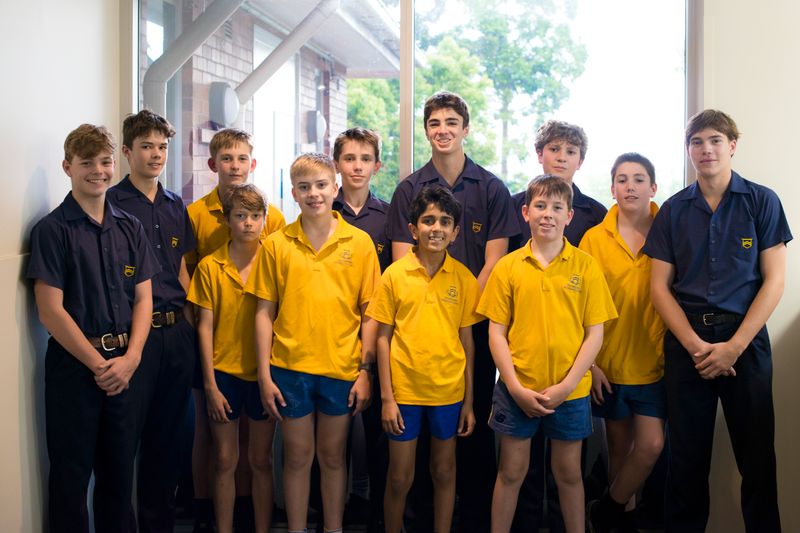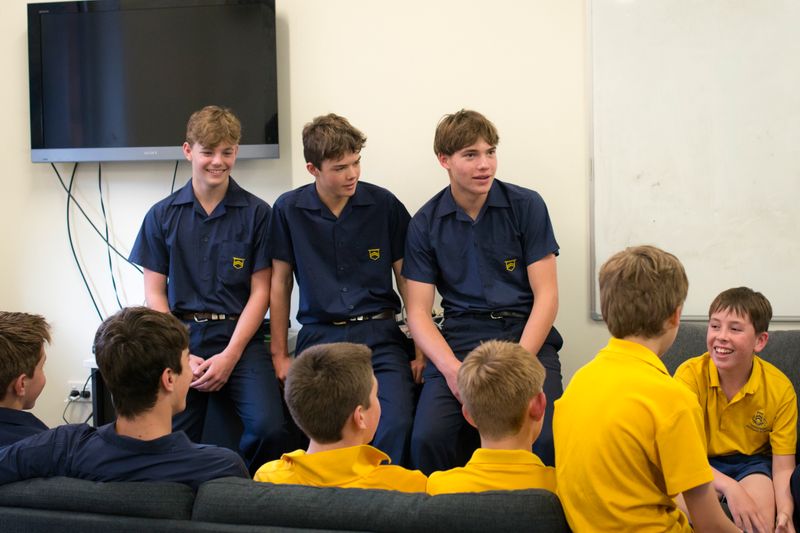“In doing so, the Year 10 boys act as coaches to guide the boys through these problems, providing advice from personal experience via the embedded leadership curriculum. The intention of this curriculum is to provide a shared language for emotional expression, thus providing Year 7 boarders with the vocabulary to express themselves and to model vulnerability and reciprocal patterns of self-disclosure.”Mr Henry White, Head of Corfe House

A residency designed to foster a positive sense of belonging.
As a boarding master of adolescent boys, my role fundamentally concerns pastoral wellbeing and character development to support a successful academic journey. A positive sense of belonging — where boarders feel safe, supported and heard — is fundamental to an effective boarding environment. As such, I felt there was a distinct connection between the International Boys’ Schools Coalition’s (IBSC) theme for the 2024–25 Action Research Cohort, “Boys and Belonging” and what I believe is best practice boarding in Corfe House.
Through 10 years of experience in boys’ boarding houses, I’ve observed a reluctance among boys to voice their concerns and express themselves emotionally, thus allowing themselves to be vulnerable amongst their peers and immediate support network. This reluctance significantly impacts their ability and willingness to disclose problems and seek help. Consequently, it affects their sense of belonging within the boarding environment and has broader implications for their holistic development. This issue is particularly pertinent for boarders in Corfe House, who are in the early stages of identity development.

I’ve noticed that even boys with emotional maturity or the tools to communicate their concerns are not necessarily inclined to do so. This observation has led me to consider the connection between a boarder’s sense of trust and their willingness to display vulnerability, likely influenced by cultural norms related to masculine identity rather than just their ability to articulate themselves. I believe that fostering a heightened sense of belonging within a boarding environment may effectively counter these cultural norms.
When considering this context amongst the larger body of research literature, it is frightening to consider the bigger picture at play — that being the damning statistics surrounding Australian men and issues pertaining to men’s mental health and suicide. I’d like to think these concerning trends can be countered by positive cultural shifts that promote male vulnerability and allow men to speak out and seek support without fear of shame or being perceived as weak.
As such, the purpose of my research project is to provide my Corfe House boarders, who embark upon their broader boarding journey at a relatively impressionable age, with the necessary skillset, confidence and vernacular to effectively communicate issues presenting as barriers to their pastoral wellbeing and sense of belonging. In doing so, they are encouraged and empowered to be vulnerable rather than repressing their feelings — a common trait we see with adolescent boys, often influenced by cultural factors and a lack of words to articulate their emotions.

To enable this project, we initiated the official Corfe House Year 10 Service and Leadership Residency Program at the commencement of Term 2 in 2024 — a residency for Year 10 boarders with aspirations for leadership and a willingness to serve. So far, we’ve been incredibly impressed by the newfound sense of calm within Corfe House and the positive mentoring that has developed organically. Within this residency, we have embedded a Leadership and Character Education Program for Year 10 residents comprising explicit teaching in leadership, coaching, peer support and lessons in positive masculinity. Through this program and weekly mentoring and coaching sessions where the Year 10 residents embed these skills and knowledge within their own “Mentor Session”, we have sought to educate and broaden student perspectives that align with the TGS purpose — “Educating boys and developing their good character for life.”
During the mentoring sessions, the Year 10s share previous challenging experiences from their own time in Year 7 Corfe House boarding (thus modelling vulnerability), allowing an informal platform for Year 7 boys to reciprocate and share any current challenges they are facing.
Furthermore, as a means of measuring Corfe House boarders’ increased willingness to be vulnerable, Year 6 and 7 Corfe House boarders undertake a daily wellbeing survey each evening designed to gauge boarders’ daily emotional wellbeing and their willingness to disclose their problems, thus providing a platform to demonstrate their vulnerability.
While a boarding leadership residency is not a revolutionary concept, the embedded Leadership and Character Education Program and new methods to measure boarder pastoral wellbeing offer a valuable point of difference for our School. In addition, Year 10 residents become participants in the wellbeing and pastoral care of younger boarders — a novel experience that fosters personal relationships and good character development — rather than simply being a presence. Moreover, by empowering Year 10 residents with leadership capabilities and opportunities to exercise these skills, they also develop their own leadership identity and sense of belonging through ownership within the larger boarding program.
Latest Blog
TGS Rugby Ambassadors' Program
“As a Grammar boy, you have the Blue and Gold in your blood for life. You’ve got connections and networks because of this special bond. It’s hard to describe what it is exactly; I think it stems from the history and traditions that are passed down to each generation but it’s something you carry your entire life, you’re part of this team.” – TGS Old Boy (1960-63) John Campbell, Senior Prefect 1963, Captain 1st XV Rugby 1963. John was excited to learn in a recent edition of The Blue and Gold…
TGS Leading the Way for IT in Education
Toowoomba Grammar School is fortunate to have a strong partnership with Microsoft / School Locker. We are a Microsoft Lighthouse School, leading the way in technological advancement and deployment in Australian schools. This recognition would not be possible without two key factors: our “whole school” approach to IT, whereby the School supplies every student with the same devices, ensuring equality for all boys from Prep to Year 12.our dedicated IT team, who are based on-site to immediately…
Holiday Reading
Reading is one of those activities that, the more you do, the better you get, and with the holidays fast approaching, now is the perfect time to read that book you’ve always wanted to, finish a book you’ve started or try something new. It is important to keep reading over the holidays, so that we don’t step backward in our reading journey. As the Organisation for Economic Cooperation and Development (OECD) has found, reading for pleasure is a habit that can prove essential to performing well…
Developing Generational Change in our Men – Stand Up and Speak Out
The devastating effects of domestic and family violence (DFV) are more prominent today as this previously ‘taboo’ issue is finally being publicly recognised and addressed. Toowoomba Grammar School is proud to be leading the way in creating generational change for this sensitive issue through a variety of School initiatives and by supporting community groups associated with DFV. Our programs are aimed at developing good men of the future who will “Stand Up and Speak Out.” TGS became a White…
The Barbour Connection
They will tell tales of meeting someone on the other side of the world whom they spotted wearing a TGS cap. It led to an instant connection. Of getting their dream job by simply proudly sporting a TGS Old Boy tie at the interview. It led to an instant connection. There is no denying that Toowoomba Grammar School students share a special bond. We celebrate it with our annual Old Boys’ Sons and Grandsons photo and our Old Boys’ Generations Gathering dinner. You see it in the playground at…
“I’ll Be There for You” at Toowoomba Grammar School
“I’ll be there for you” was the theme of National Boarding Week. This statement is particularly relevant at Toowoomba Grammar School as the boarders, the dayboys and the staff, help each other in the good times and the bad. We see our school as a ‘boarding school’, not a ‘school with boarders’. We are proud to be one of the oldest and most highly regarded boys’ boarding schools in Australia, providing a home away from home for boys for almost 150 years. TGS came from very humble beginnings. The…
Helping families navigate rules, rewards and consequences for boys
Recently I was in a webinar that aimed to tackle the issues surrounding technology and its effects on students. Some members of the forum started openly criticising boys for their poor behaviour. Whilst their criticisms were not directed specifically at our boys, I was offended at their general statements. We can be too quick to criticise boys and we forget that their frontal lobes are still developing. We also forget that their brains are “wired” differently from girls and that they don’t see…
Accepting Our Past, Creating Our Future
Toowoomba Grammar School has added the new role of Indigenous Education Coordinator to the School’s offering, to further promote a culture of diversity, inclusivity, and reconciliation. Mr Scott Gale has been appointed to this ground-breaking position that aims to spread awareness and understanding of the significance of Australia’s culture and history. “That’s something that has been lacking in Australia’s education system for so long,” said Scott. “It’s an extremely significant part of our…
The Gift of Music
You can feel the pride and passion exude from Janelle Fletcher as she reflects on her thirty-year career as a Music Tutor at Toowoomba Grammar School. “It’s a long time to stay in any job,” she admitted. “But working with the boys, seeing how important it is to have music in their lives and to develop not only as musicians but as people, that’s what’s kept me here.” Janelle believes staff in an all-boys’ school have a real understanding of boys. “It’s been very positive for me to see the…